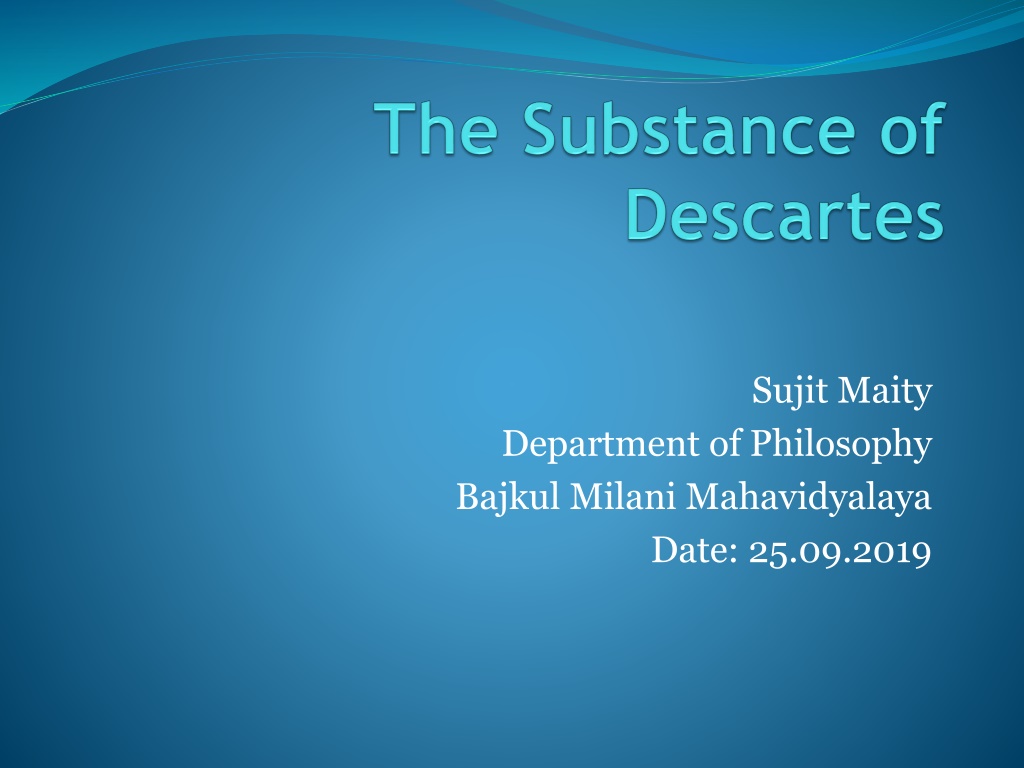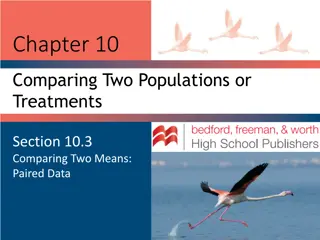
René Descartes: Father of Modern Philosophy and Science
René Descartes, known as the father of modern philosophy, was a French philosopher, mathematician, and scientist. He introduced Cartesian coordinates and made significant contributions to mathematics, physics, and physiology. Descartes' dualism and emphasis on reason influenced later philosophers, and his ideas had a profound impact on the development of modern philosophy and science.
Download Presentation

Please find below an Image/Link to download the presentation.
The content on the website is provided AS IS for your information and personal use only. It may not be sold, licensed, or shared on other websites without obtaining consent from the author. Download presentation by click this link. If you encounter any issues during the download, it is possible that the publisher has removed the file from their server.
E N D
Presentation Transcript
Sujit Maity Department of Philosophy Bajkul Milani Mahavidyalaya Date: 25.09.2019
Introduction to Ren Descartes (1596-1650) Ren Descartes, often referred to as the "father of modern philosophy," was a French philosopher, mathematician, and scientist. Descartes was born on March 31, 1596, in La Haye en Touraine, a small town in France (now known as Descartes). Descartes died on February 11, 1650, in Stockholm, Sweden, where he had moved to serve as a tutor to Queen Christina. At a young age, Descartes developed a passion for mathematics and sought to establish a method for acquiring knowledge that was certain and indubitable.
Mathematical Contributions: Descartes is famous for introducing Cartesian coordinates, a system that uses algebraic equations to represent geometric shapes, and for laying the groundwork for analytic geometry. His work "La G om trie" (1637) applied algebra to geometry and had a significant impact on the development of calculus.
Scientific Endeavours: Descartes made contributions to physics, optics, and physiology. He proposed a theory of the nature of light and its reflection, as well as the law of refraction. His work in anatomy and physiology included theories on the movement of blood and the interaction between the body and the pineal gland.
Legacy and Influence Descartes' ideas sparked both admiration and controversy during his lifetime and had a profound influence on subsequent philosophy and science. His dualism and emphasis on reason influenced later philosophers such as Spinoza, Leibniz, and Kant. Descartes' mechanistic view of the universe also contributed to the development of modern science.
Significance in the History of Philosophy Father of Modern Philosophy Method of Doubt Cogito, Ergo Sum Cartesian Dualism Mechanistic Universe Rationalism Methodological Individualism Influence on Modern Philosophy
Descartes' concept of dualism Mind as a Thinking Substance Descartes proposed that the mind, or mental substance, is distinct from the physical body and is characterized by its ability to think, reason, doubt, perceive, and engage in conscious experiences. The mind is immaterial, indivisible, and non-spatial. It lacks physical properties such as extension, shape, or location. Descartes' assertion "Cogito, ergo sum" ("I think, therefore I am") is a key expression of the existence of the thinking self. He argued that while one can doubt everything, the very act of doubt confirms the existence of a thinking self.
Mind (Res Cogitans): The mind, or thinking substance, is characterized by its capacity for consciousness, thought, reason, perception, emotion, and introspection. It is immaterial, lacking physical attributes such as extension, location, or spatial dimensions. Unlike the body, the mind does not occupy space. The mind is indivisible and not subject to the laws of physics that govern the behavior of physical objects. It is self-aware and has the ability to reflect upon itself, leading to Descartes' famous assertion "Cogito, ergo sum" ("I think, therefore I am").
Body as an Extended Substance The body, or extended substance, refers to the physical material entity that possesses attributes of extension, shape, size, and motion in space. It is governed by the laws of physics and can be studied using empirical methods and mathematical analysis. Unlike the mind, the body lacks consciousness and self-awareness. It operates based on mechanistic principles and follows causal relationships.
Interactionism: While Descartes maintained a clear distinction between mind and body, he also proposed that they interacted through the pineal gland, a structure in the brain. This interaction allowed mental states to influence bodily states and vice versa. The pineal gland, according to Descartes, served as a point of connection between the immaterial mind and the material body.
Unity of the Mind-Body Relationship: Despite the distinction between mind and body, Descartes maintained that the mind and body are closely connected in human beings. He argued that the pineal gland, as the point of interaction, serves as a unifying link between the two substances.
Critiques and Legacy: Cartesian dualism has faced criticism for the challenge it poses in explaining the interaction between the mind and body. The "mind-body problem" remains a significant topic of debate in philosophy of mind. Despite its challenges, Cartesian dualism has had a lasting influence on discussions and has shaped the development of modern philosophy, psychology, science. subsequent philosophical and cognitive
Significance and Implications: Descartes' distinction between mind and body has profound implications for our understanding of human nature, consciousness, and the nature of reality. This dualism raises questions about the relationship between mental experiences phenomena, leading to the mind-body problem and debates about how mental states can influence physical states and vice versa. and physical
Definition of Substance: Substance is often described as that which exists in itself and is not dependent on anything else for its existence. It is the underlying reality that remains constant while attributes and changes occur.
Essence and Identity: Substance is closely linked to the idea of essence, which represents the intrinsic and defining characteristics that make something what it is. Substance provides the identity and continuity of an entity despite changes in its attributes or properties.
Types of Substance: Philosophers have debated the nature of substances, categorizing them into Substance: The individual entities or beings that possess substance in themselves (e.g., a specific person or object). Secondary Substance: The general categories or kinds to which primary substances belong (e.g., human nature, animal species). Substance as Matter: Substance as the underlying material or physical reality of things. Substance as Form: Substance as the essential form or nature that gives structure and identity. different types:Primary
Change and Persistence: Substance provides a framework for understanding change and persistence. While attributes and properties may change, the underlying substance remains the same. This concept helps address philosophical questions about identity over time and the nature of personal identity.
Challenges and Debates: The concept of substance has faced criticism and challenges, particularly in relation to defining the nature of substance, its relationship to attributes, and its role in a changing world.
Modern Relevance: The concept of substance continues to influence contemporary discussions in philosophy, particularly in metaphysics, philosophy of mind, and ontology. Questions about the nature of reality, causation, and the relationships between substances are ongoing areas of exploration.
Conclusion Descartes' contributions to philosophy, ranging from his method of doubt and rationalism to his dualism, mechanistic worldview, innovations, have had a lasting and profound impact on the way we approach knowledge, reality, and the relationship between mind and matter. His ideas continue to be a source exploration for philosophers, scientists, and scholars across disciplines. and mathematical of inspiration and






















